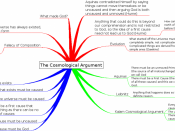We do not have good reasons to believe in something
transcendental. Most of the arguments in favor of God, or a
so-called 'higher power' are based on faith and emotion, and not
a clear logical argument. In fact, these arguments are often in
favor of throwing logic out the window. In many ways, this
question is similar to someone attempting to prove the existence
of an invisible elephant. It is far easier to prove that the
elephant does not exist than it is to prove that it does.
Socrates' principle of examination states that we must
carefully examine all things. The tools we humans use to do this
are logic and the scientific method. In order to believe in
something transcendental, you cannot examine your beliefs using
logic and science. If you do, there is no way to prove the
existence of a higher power.
The primary argument against the existence of a Judeo-Christian
all-knowing, all-powerful, righteous God is the argument from
evil. This argument argues against the presence of a higher
power using facts of ordinary life. This argument states that
most would agree that some of the pain and suffering (evil) in
this world is unnecessary. To be considered a necessary evil,
the occurrence must be the only way to produce something good,
which outweighs the evil. Many events, such as infant deaths,
would not be classified in this category.
If such an all-knowing deity existed, it states, He would know
that this evil was occurring. If He was all-powerful, He would
have the power to stop this evil. If He was righteous, He would
stop the evil from occurring Therefore, the existence of evil
cannot be compatible with the existence of this type of God.
The primary response to the argument from evil is the...


